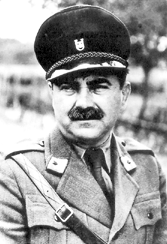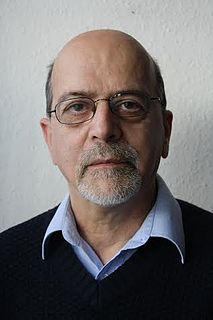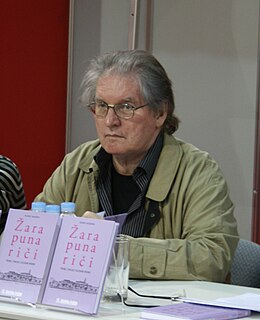 W
WIvan "Ivo" Brešan was a Croatian playwright, novelist and screenwriter, known for political satire. His work included screenplays written with his son Vinko.
 W
WMile Budak was a Croatian politician and writer best known as one of the chief ideologists of the Croatian fascist Ustaša movement, which ruled the Independent State of Croatia during World War II in Yugoslavia from 1941–45 and waged a genocidal campaign of extermination against its Roma and Jewish population, and of extermination, expulsion and religious conversion against its Serb population.
 W
WBoris Dežulović is a Croatian journalist, writer and columnist, best known as one of the founders of the now defunct satirical magazine Feral Tribune.
 W
WPredrag Finci is a philosopher, author, and essayist. His work is best known for its combination of erudition, philosophical and aesthetical insights, and personal experience. Finci writes extensively in his native language and also in English. A great number of articles and reviews of Finci’s books have been published in Bosnia and Croatia.
 W
WBoris Havel is a Croatian historian, translator, journalist, politologist and Middle East expert, docent on Faculty of Political Science of University of Zagreb former employee of Ministry of Foreign and European Affairs. He is court interpreter for English, Hebrew and Swedish language.
 W
WHrvoje Hitrec is a Croatian writer and politician. He is notable for his works for children and youth, most famous of his works being Smogovci, but he also wrote novels, film and TV scripts, dramas. He received several notable Croatian literary awards: "Ksaver Šandor Gjalski," "Ivana Brlić Mažuranić" and "Grigor Vitez."
 W
WJulije Kempf was a Croatian historian and writer. Kempf was born in Požega, Slavonia. After graduating from Požega gymnasium, he attended teachers school in Zagreb. Afterwards, he worked in Novi Vinodolski as a teacher, before returning to Požega in 1885 to teach in Elementary school for boys.
 W
WAntun "Ante" Kovačić was a Croatian writer who is best known for his magnum opus work U registraturi.
 W
WJosip Kozarac was a Croatian writer.
 W
WEugen Kumičić was a prominent Croatian writer and politician. Kumičić was one of the most prolific Croatian novelists of the realism era and a pioneer of naturalism in Croatian literature.
 W
WJanko Leskovar was a Croatian novelist. His literary form was marked with the novel Misao na vječnost.
 W
WMato Lovrak was a Croatian writer for children.
 W
WIgor Mandić is a Croatian writer, literary critic, columnist and essayist.
 W
WRanko Marinković was a Croatian novelist and dramatist.
 W
WPredrag Matvejević was a Yugoslav writer and scholar. A literature scholar who taught at universities in Zagreb, Paris and Rome, he is best known for his 1987 non-fiction book Mediterranean: A Cultural Landscape, a seminal work of cultural history of the Mediterranean region which has been translated into more than 20 languages.
 W
WVjenceslav Novak was a Croatian Realist writer, dramatist, and music historian.
 W
WPavao Pavličić is a Croatian writer, literary historian and translator whose main focus are crime novels. He writes for both adults and children.
 W
WPetar Šegedin was a Croatian writer.
 W
WAugust Ivan Nepomuk Eduard Šenoa was a novelist. Born to an ethnic German and Slovak family, Šenoa became a key figure in the development of an independent literary tradition in the Croatian language and shaping the emergence of the urban Croatian identity of Zagreb and its surroundings at a time when Austrian control was weaning. He was a literary transitional figure, who helped bring Croatian literature from Romanticism to Realism and introduced the historical novel to Croatia. He wrote more than ten novels, among which the most notable are: Zlatarovo zlato, Čuvaj se senjske ruke, Seljačka buna, and Diogenes (1878).
 W
WAnte Tomić is a Croatian writer and journalist.
 W
WGoran Tribuson is a Croatian prose and screenplay writer.
 W
WVinko Vrbanić is a Croatian writer who lives in Vinkovci, Croatia. He is best known for his published short stories, novellas Furmani [Carters] and Sokolov let [Flight of the Falcon], and coming-of-age novel Glasovi u šumi [Voices in the Forest]. He graduated from the School of Agriculture in Požega, worked in construction, and fought in the Croatian War of Independence.
 W
WPetar Zoranić was a Croatian writer and poet from Zadar. He is most important as the author of Planine, regarded as the first Croatian novel. Pastoral in nature, the novel was written in 1538 and published in 1569. Zoranić wrote two other works, Ljubveni lov and Vilenica, but neither of these has survived.